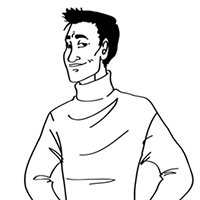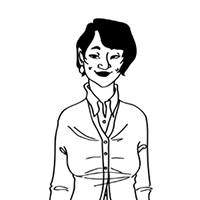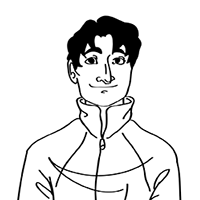Вы всё по́няли? 1.3 Немно́го о себе́
Remember that зовут means “they-call”--so the word его means “him,” and “её” means “her.” Note that его is spelled Е-Г-О but pronounced [Е-В-О].
Упражне́ние 1.
Denis is showing you some of his photos. It’s hard to keep track of all those names, but you can use the pronouns to help you. Click on the person he is talking about for each picture.
Кто э́то?
By now you have seen several words that describe male and female categories; студе́нт / студе́нтка (university student) and аспира́нт / аспира́нтка (graduate student) are examples. A number of Russian nouns describing people and professions will have separate words for male and female, although many others you will see later on will use just one word.
Упражне́ние 2.
Help to sort out who is who in our story. Look at the pictures and click on the word that logically and grammatically completes the statement.
Упражне́ние 3.
At their respective universities in the US, Tony and Amanda each happen to know one person named Sasha, one Nicki and one Alex. All three names could be male or female. First you will hear the names of three of Tony's friends, who are undergrads. Based on the sentence you hear, choose an appropriate continuation for the introduction. Be sure to listen for the pronoun to help you choose.
Now you will hear a similar list of Amanda's friends. They are all graduate students.
Use good learning strategies!
You may find it useful to learn some new expressions as whole phrases, rather than as individual words. Often you will have an opportunity later on to “get to know” those phrases in more detail and get better at manipulating the elements of the phrase grammatically. For others you will just need to know them as whole phrases. For now learn the «зовут» expressions as complete phrases.




